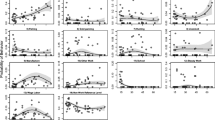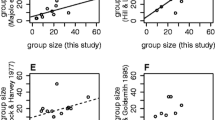Abstract
A method is suggested to evaluate on an empirical basis sampling plans for the longitudinal study of primate behavior in those very common situations in which the mathematical structure of behavior is unknown. The method is based on a randomization procedure applied to a pilot sample of the behavior organized so that cost of implementation of a sampling plan can be evaluated vis á vis the sampling error intrinsic to the plan.
Similar content being viewed by others
References
Chassen, J. B., 1967.Research Design in Clinical Psychology and Psychiatry. Appleton-Century-Crofts, New York.
Hinde, R. A., 1973. On the design of check-sheets.Primates, 14: 393–406.
McGinnis, P., H. C. Kraemer, C. H. Doering, C. Csongradi, & D. A. Hamburg, 1976. The Stanford Outdoor Primate Facility: A new laboratory for the combined study of ethology and biochemistry in chimpanzees. Manuscript.
Riss, D. & C. Busse, in prep. 50 days in the life of a free-ranging adult male chimpanzee at Gombe Stream.
Author information
Authors and Affiliations
About this article
Cite this article
Kraemer, H.C., Alexander, B., Clark, C. et al. Empirical choice of sampling procedures for optimal research design in the longitudinal study of primate behavior. Primates 18, 825–833 (1977). https://doi.org/10.1007/BF02382933
Received:
Accepted:
Issue Date:
DOI: https://doi.org/10.1007/BF02382933




